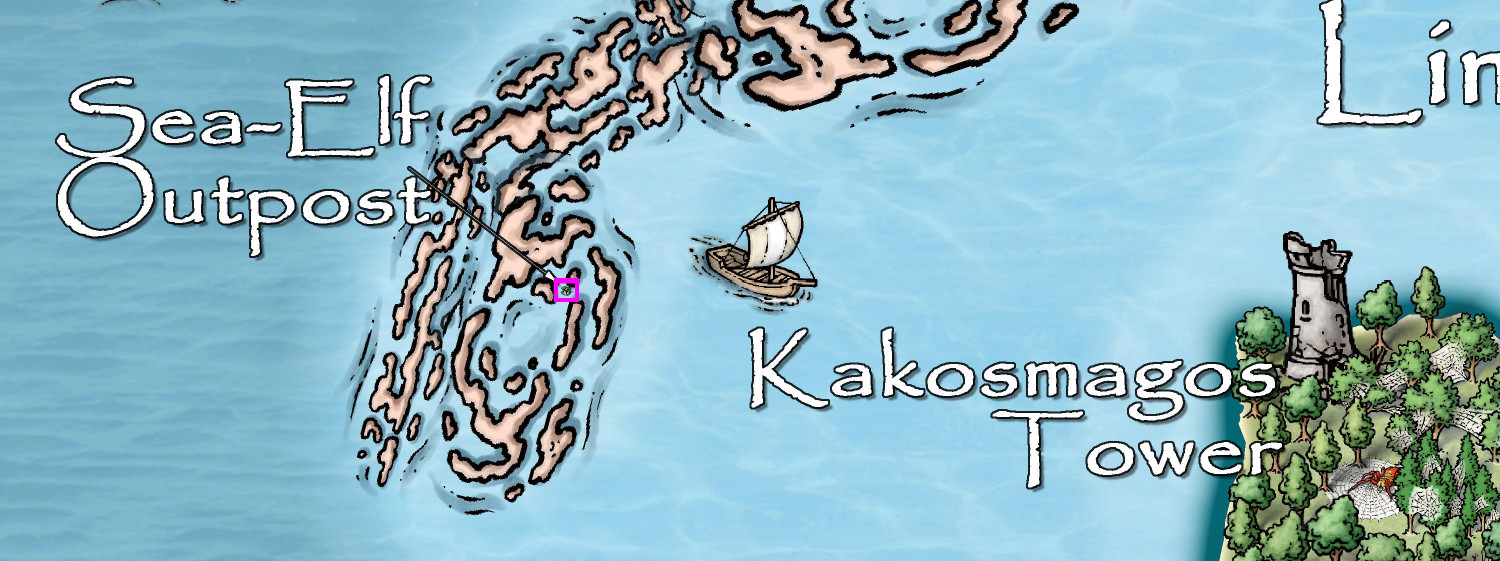Community Atlas - Sea Elf Outpost (off the coast of Menina Island)
Hi @Monsen,
@Quenten kindly created a place on his Menina Island map for my Sea Elf Outpost, which I would like to submit for the Community Atlas.
This is the part of the map where it's located:
Is that too small of a space to claim?
I will post the relevant files in a follow-up on this thread, and also my details as a first-time contributor to the Atlas.




Comments
As a first-time contributor to the Atlas, here are my details:
Name to Appear: Kevin Goebel (Royal Scribe)
Contact Info: @Royal Scribe, kcgoebel.b2@gmail.com
URL: https://goebel.gay/wiki-index/
Sea Elf Outpost
FCW:
Toggle: "Cover - Island Top" layer to show/hide the top of the island covering the top of the underwater/underground outpost.
CC3+ Style: primarily Marine Dungeons
Map Notes
The Sea Elves are extremely reclusive: although they are able to breathe air and walk on land, they prefer to live beneath the waves and associate with other intelligent marine creatures instead of their land-dwelling creatures. When they must travel on the surface land, they often disguise themselves as high elves or wood elves, so that few humans even know that the elves have aquatic cousins.
This Sea Elf Outpost is one of numerous hideaways located near to human coastal towns where they can spy on the human navies and merchant ships. The outpost also serves as a stop on sea elf rangers tours of duty, a waystation for sea elf travelers, and a meeting spot for other intelligent aquatic allies.
Sea Elves have darkvision, allowing them to see in the dark caverns beneath the outpost's island. Even so, the outpost is generally well lit with luminescent crystals. Most shed light ranging from the equivalent of candlelight to the equivalent of a good lantern, but a few emit actual daylight, nourishing the underwater plantlife in the caverns. A few small hydrothermal vents warm the sea water and provide nourishment for tiny organisms that sea anemones and urchins feed upon.
1. MAIN ENTRANCE: The main entrance is camouflaged with seaweed and sea grasses.
2. GUARD STATION: When the outpost is properly staffed, a few sea elves are posted at the guard station at all times to waylay intruders and sound the alarm to the rest of the outpost.
3. WELCOMING CHAMBER: A reception room where visitors are met by the elves they are visiting.
4. UNDERWATER GARDEN: Here, the elves grow seaweeds and aquatic mushrooms to supplement the seafood they hunt. A solar luminescent crystal provides sunlight for the plantlife, and a small hydrothermal vent warms the water and allows miniscule organisms to thrive.
5. GREAT HALL: One of the largest underwater rooms, and the principal gathering spot for the outpost's residents and guests. A mosaic of an octopus is on the otherwise sandy floor. Chairs are not provided; who needs chairs when you're floating beneath the waves?
6. STORAGE/SUPPLIES: This room is primarily used to stow the weapons of visitors until the outpost's commander trusts them enough to bear arms.
7. ARMORY: Used for the outpost's garrison to equip themselves with weapons suitable for aquatic combat: spears, tridents, nets, scimitars, and daggers.
8. TREASURY: Here the sea elves store the plunder rescued from capsized ships, which they use to bribe human port officials for news about human affairs.
9. VIP BEDROOMS (WET): Three single-occupancy bedrooms. Each is equipped with several chests and a hammock, which the resident ties themselves into at night so they don't float away in their sleep.
10. MARINE GARRISON: The sleeping quarters for the outpost's garrison. It has eight hammocks and chests for stowing personal items.
11. STORAGE: Includes several chests and cabinets for storing items that won't be ruined by water.
12. TRANSITION ROOM: This room is nicknamed the "Transition Room," as one of the main connections between the areas below water to the areas above it. It is one of three marine rooms in the outpost where the water doesn't reach the ceiling.
13. CHANGING/DRYING ROOM: Most of the sea elves wear lightweight linen clothing that dries quickly. For others, dry clothing is available in this room for visitors to change out of their soggy clothing.
14. LESSER HALL/MAP ROOM: The Lesser Hall is nicknamed the "map room" because it is here that the outpost's commanders and leaders study maps and written documents that would be destroyed beneath the water in the Great Hall.
15. ARMORY/STORAGE: A small storage room often used to stash weapons more suitable for combat on land.
16. CHAPEL: The second of three marine rooms where the water doesn't reach the ceiling. Elves on land often use a henge of seven stones as places to worship the seven gods of their pantheon. Here, the sea elves use pillars as a substitute for the henge stones. The eastern side of the room has a tiled platform above the water.
17. DINING HALL: Here, the outpost's residents and guests can gather to eat communally. Cabinets here store dishes and dining utensils.
18. KITCHEN: Here, the sea elves cook without using fire, for the smoke would quickly overwhelm the residents. Instead, stoves that would normally be wood-burning are heated with a type of luminescent crystal that generates heat. Individually, each crystal's heat is modest, but 35 of them in a metal pan can heat the stove well enough to cook a meal.
19. PANTRY: Food storage for the outpost's residents and guests.
20. COMMANDER'S QUARTERS: Though the outpost's commander sometimes sleeps in one of the VIP marine bedrooms, they are also granted a dry bedroom, necessary for private documents that would be destroyed underwater.
21. VIP BEDROOMS (DRY): Two double-occupancy bedrooms with proper beds.
22. GROUP BEDROOM (DRY): Seven proper beds for the garrison when they would prefer a dry night's sleep, or for the rare group of land-lubber guests.
23. RECREATION ROOM: Here, the garrison can gather to socialize playing games and making music.
24. DOLPHIN CHAMBER ENTRANCE: A second underwater entrance to the outpost is similarly concealed by seaweed and a kelp forest.
25. DOLPHIN CHAMBER: The third of three marine rooms where the ceiling is higher than the sea. It has become a meeting spot for the sea elves' allies: merfolk, intelligent dolphins, and an intelligent octopus.
26. LOCKUP: Seven cells can hold unwary adventurers who have stumbled across the sea elves and have been taken prisoner.
27. THE GREAT STAIRCASE: Here, a staircase spirals up to the top of the hill overlooking the beach where the sea elves can hide among the trees and spy on human ships.
28. TELEPORTION PORTAL: A teleportation portal in a heavily locked room allows for powerful sea elf mages to pop in...or make an expeditious retreat.
29. ARMORY/SUPPLIES: Here, the elves stash land weapons like bows and arrows, along with other equipment needed to spy on the humans.
30. LOOKOUT EXIT: At the top of the Great Staircase, a spiral stair leads to the mouth of a cave where the elves can access the top of the hill.
31. ALLIGATOR COVE: A popular breeding ground for alligators in the area. They manage to deter casual visitors to the island. More determined visitors are usually scared off by the sea elves' attempts to convince them that the island is haunted.
PDF and TXT Map Notes
Thanks Kevin. The map is now in the atlas. Welcome as a contributor, it is much appreciated.
That linked area do get a bit small though, very hard to see. Maybe someone wants to make an intermediate map showing the surrounding reef area in more detail.
(This will be the last map I add for a couple of weeks)
Thank you!